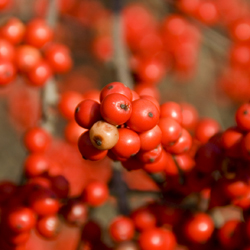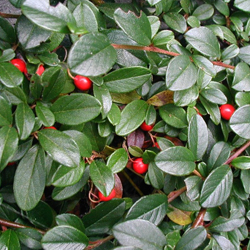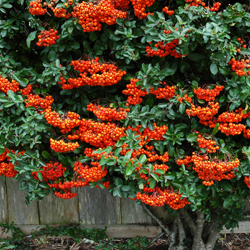Ho, ho, ho! Maybe you don’t need the reminder…but the holidays are quickly approaching. What plant do you think of for the holidays? HOLLY, of course.
As the “red and green” plant, hollies have represented this time of the year for centuries. In fact, the Pagans, Druids and Romans used hollies in their winter rituals. The Romans celebrated a festival called “Saturnalia” and used holly as an offering to Saturn, a god of agriculture. Early Christianity embraced many of their symbols, including holly. They placed holly over the door as protection from unearthly demons!
Nowadays, holly enthusiasts don’t use it for protection. Rather, they appreciate the plant, and other berry plants, for their many uses in the garden.
It’s easy to see why. In a season where few plants are blooming and there is little color, the brightly colored berries perk up the otherwise drab landscape.
Although there are hundreds of holly species, the one generally associated with the winter holidays is the English Holly or Ilex aquifolium. The crinkled 3-4″ long leaves are quite distinctive with three to five sharp spines on each side, darker green on top, lighter on the underside, shiny and leathery. While many gardeners still think of English Holly as a small tree or shrub, there are many other varieties available to perfectly suit their garden’s needs. Luckily for holiday decorators, most have those bright red plump winter berries.
Most hollies are “dioecious,” meaning there are male and female plants. The beautiful red berries only appear on the female plants after pollination by a nearby male. If you haven’t noticed other hollies in your neighborhood, you may need to purchase one of each to be sure you’ll have those wonderful winter berries with your greenery.
Hollies are easy to grow. After choosing the best variety for your needs, plant in a full sun location to produce the most berries. Provide rich, slightly acidic soil with good drainage. Prune hollies in the winter to maintain shape and size or to rejuvenate if it has become leggy. Use the clippings to provide indoor decorations.
Not into traditional holly? There are numerous other plants that provide beautiful berries for your enjoyment.
| Color | Common Name | Scientific Name |
| Bright red | American Winterberry | Ilex verticillata |
| Bright red | California Christmasberry or Toyon | Heteromeles arbutifolia |
| Red | Cotoneasters | Cotoneaster varieties |
| Red | Pyracantha | Pyrancantha varieties |
| Dark red | Crabapples | Malus varieties |
| Orangey-red | Barberry | Berberis varieties |
| Orangey-red | Nandinas | Nandina domestica |
| Orangey-red | Pepper tree | Schinus terebinthefolius |
| Blues | Mahonia | Mahonia varieties |
| Blues | India Hawthorne | Rhaphiolepsis indica |
| Purples, blues, dark red | Beautyberry | Callicarpa varieties |
| Purples | Sapphire berry | Symplocos paniculata |
| White | White Beautyberry | Callicarpa dichotoma ‘Albifructa’ |
| White | Snowberry | Symphoricarpos albus |




